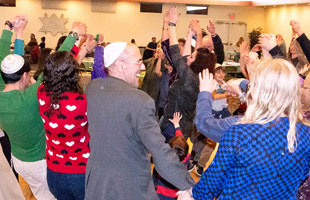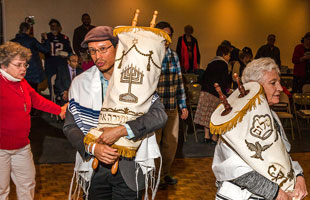Friday Evening Services: Welcoming Shabbat
Services on Friday evenings are shown on Zoom and live streamed on Facebook. The links for these alternative media can be found online in the CBI weekly announcements. For those who do not get the weekly email, which is sent only to members, there is a link to live stream the services at the bottom of this page. Unless otherwise announced, the services begin at 6 PM and end at 7 PM. Most of the time, these services are lay-led, by skilled congregants. This provides a rich and varied worship experience, allowing our congregants to experience a wider range of beautiful melodies and styles for the Sabbath prayers, psalms, and hymns. The spirit of participation and involvement by all our congregants is at the heart of our worship: We depend upon all our congregants for their attendance, participation, voices, and prayers during each service.
Several times during the year, a special Friday service is held, featuring our spiritual leader Hazzan Jonathan Angress, who is highly skilled in the liturgy and who shares many beautiful and unique melodies. In addition, we plan to resume our “Shabbat Sparks” programs that were curtailed during the pandemic shutdown in 2020. These Friday evening services feature special speakers from the congregation or the community at large, on topics relevant to Jewish life and worship; as well as music and singing accompanied by guitar and/or other instruments as permitted, when the seasonal variation in sundown allows.
Saturday Morning Shabbat Services
Services begin on Saturday mornings at 9:30 AM, and include P’Zukai d’Zimra, Shacharit, Torah service, Musaf, and concluding prayers. A brief Kiddush is included at the conclusion of services, and congregants assemble in the social hall directly following this, to share a congregational Kiddush, followed by a kosher Kiddush luncheon. For information on viewing services on Zoom or live stream, see the section above (Friday Evening Services). Our Kosher kitchen is supervised by our spiritual leader, Hazzan Jonathan Angress. The meals are prepared by a kosher caterer, “Kosher Gourmet”, on site, and are pareve and/or dairy.
The Saturday morning services are led by Hazzan Angress, and by numerous members of our congregation who possess synagogue skills. Congregants are strongly encouraged to participate on the bimah as their skills allow. At present, a large cadre of congregational lay leaders contribute regularly to the services, either by leading certain segments, reading Torah portions, Chanting Haftarah, and/or giving a Torah lesson (D’var Torah). The entire service lasts approximately 2-1/2 hours, but each congregant is welcome to come and participate in as much or as little of each service as he/she desires or is able. Children from very tender ages to beyond B’nai Mitzvah are welcome and are encouraged to join the Hazzan and other service leaders on the Bimah to participate as much as they are able. Our youth are the future of our Jewish worship and heritage, and thus are treasured and nurtured here at CBI.
Our Shabbat prayer book is Lev Shalem, and offers a very enriching and user-friendly format, with sidebars that include special prayers apart from the liturgy, as well as many enlightening insights into the liturgy. There are also cues included in the body of the liturgy text, indicating where to resume the prayers on each page during the oral Musaf recitations; and when to bow during the silent and Musaf recitations. For those who don’t read Hebrew, the prayers are duplicated in English on the left pages, and many of the prayers are also written in transliteration on the left, allowing all congregants to fully participate as they wish.
The silent Amidah allows each of our congregants the space to concentrate on the prayers most personally meaningful, and to focus on his/her own prayers. Although our services take time, they allow us the opportunity to immerse ourselves in the prayer process, each according to his/her needs. Afterwards, the Musaf portion uplifts us with its beautiful melodies.
Weekday Worship, the Minyan
At CBI, the Minyan is a quorum of ten or more adult Jews (over the age of Bar/Bat Mitzvah), male and female, who assemble for the purpose of communal prayer. The quorum ensures that the Mourners’ Kaddish, and other prayers, can be recited for mourners or those observing Yahrzeits. A minyan is also required for publicly reading the Torah from a Torah scroll (as well as any accompanying Haftarahs). Minyan at CBI includes a reading of the weekday portion at each service, providing a quorum is present.
CBI’s “Minyanaires” are those congregants who regularly show up for morning prayer and hold the P’Zukai d’Zimra and Shacharit services in the small chapel on Mondays & Thursdays from 8:00 to 9:00 AM, and from 8:30 to 9:30 AM on National Holidays (days the synagogue office is closed). Hazzan Angress officiates at the Minyan services, and attendees can lead different portions of the service as they are able. As with all services at CBI, lay participation is encouraged and appreciated. All Minyan services are also available on Zoom, and on live stream. The links for these forms of participation are included in each week’s online and email announcements. Those attending on Zoom are also counted for a quorum; therefore, if a congregant can attend on Zoom, it is a mitzvah, allowing recitation of the Mourner’s Kaddish for all those who need to observe this ritual.
The relevance and importance of attending Minyan
Worshiping with our fellow Jews is for us a spiritual need. At some point in our Jewish lives, we may need to say Kaddish while mourning, or on the anniversary date (Yahrzeit) of a loved one’s death. A central custom of traditional Judaism is that we are commanded to bring comfort to those in mourning with our presence and to join them in their shiva observance.
Being counted among the Minyan is a way to support our fellow Jews and to participate in a meaningful way in our spiritual family. Participating in Minyan is a traditional way to reinforce our relationship with God, as well as with our friends in Shul. It is often said that the way to nurture a relationship is to communicate and converse. The Torah is God speaking to us, and our prayers are us speaking with God. Just as conversing builds a relationship between two people, praying together in synagogue builds our close relationship and friendship with God.
After Minyan services, our in-person attendees join in the social hall for bagels and coffee, discussion, and pleasant camaraderie and companionship. It’s an uplifting way to begin the day.
What to bring to Minyan
Ritual supplies
Prayer books (siddurim) are provided in the small chapel. Some members may elect to bring their own prayer books. If the service is being held in a congregant’s home because they are sitting shiva, prayer books will be provided by prior arrangement.
Out of respect, at a minimum, men wear a head covering by means of a yarmulke (kippah) or hat; married and/or observant women wear a scarf, kippah, or piece of fabric pinned to cover their heads. As one enters the synagogue foyer, there is a basket of appropriate head coverings (lace doilies and kippot) that can be borrowed. If one is entering a private residence, it would be appropriate to have one’s own head covering.
Some Minyanaires bring their own Tefillin (phylacteries, a set of small black leather boxes containing scrolls of parchment inscribed with verses from the Torah).
Torah readers may elect to bring their own yad (Torah pointer), if they have one. For morning services, a tallit (prayer shawl) is worn, either one’s own personal one, or there is a supply of tallitot (prayer shawls) in the synagogue foyer. At a private residence, one would be expected to bring his or her own if its use is desired.
Decorum
A positive attitude and mere quiet presence are an important need for comforting those in mourning, showing up to be counted in the quorum and thus allow for special mourning prayers is itself an act of kindness.
Those who are unfamiliar with the prayers can listen, read, and follow along in the service with the given prayer books.
Bringing an open heart and sense of compassion is supportive and appreciated by mourners who are in shiva, or who are observing yahrtzeit.
Knowledge and familiarity with the liturgy, a willingness to read the Torah, and/or audibly participating in–or leading–the service will elevate the experience for all who are present.



